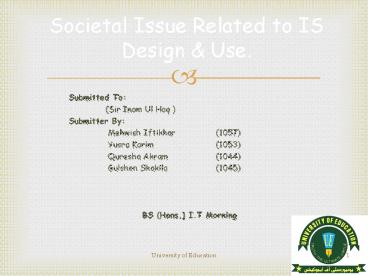Societal Issues - PowerPoint PPT Presentation
Title:
Societal Issues
Description:
Lecture 11 – PowerPoint PPT presentation
Number of Views:45
Title: Societal Issues
1
Societal Issue Related to IS Design Use.
- Submitted To
- (Sir Inam Ul Haq )
- Submitter By
- Mehwish Iftikhar (1057)
- Yusra Karim (1053)
- Quresha Akram (1044)
- Gulshen Shakila (1045)
- BS (Hons.) I.T Morning
2
Contents
- What is information system
- Societal Issue of Is design and Implication
- Information Pollution
- Societal or Ethical Hacking
- Summary of Societal Issue
- How to solve these issues
3
Definition of Information System?
- Information system is the study hardware,
software networks that people and
organizations use to collect, filter, process,
create, and distribute data.
4
Information System
ProblemDomain
Human Interaction
- Screens
- Reports
- Business Problem
DataManagement
SystemInteraction
- Devices
- Other Systems
- Databases
5
Introduction
- Information societal has been defined as the
branch of Societal that focuses on the
relationship between the creation,
organization, dissemination, and use of
information, and the societal standards and
moral codes governing human conduct in
society. - It provides a critical frameworks for
considering moral issues concerning
information privacy, moral agency (e.g. whether
artificial agents may be moral), new
environmental issues (especially how agents
should behave in the ionosphere), problems
arising from the life cycle (creation,
collection, recording , distribution, processing
etc.
6
Social Implications
- Societal Issue
- Information Pollution
- Societal or Ethical Hacking
- Summary of Societal Issue
7
Social Issue of IS
- Social issues are matters of concern to
governments and the community. They reflect
aspects of society, its people and institutions
that people want to, and can, do something about. - In terms of IPT, Social issues include
- The cost to the community of switching to
computer-based systems - The potential for society to divide on the basis
of the "information rich" and the "information
poor" - Increased "white collar crime" such as Internet
fraud and identity theft.
8
Information Pollution
- Information pollution is the contamination of
information supply with irrelevant, redundant,
unsolicited and low-value information. The spread
of useless and undesirable information can have a
detrimental effect on human activities. It is
considered one of the adverse effects of the
information revolution.
9
(No Transcript)
10
Societal Ethical Hacking
- Social engineering, in the context of information
security, refers to psychological manipulation of
people into performing actions or divulging
confidential information. A type of confidence
trick for the purpose of information gathering,
fraud, or system access, it differs from a
traditional "con" in that it is often one of many
steps in a more complex fraud scheme.
11
(No Transcript)
12
Summary of Societal Issue
- Privacy of the individual
- Accuracy of data and information
- Changing nature of work
- Appropriate information use
- Copyright laws
- Collecting
- Organizing
- Analysis
- Storing/Retrieving
- Processing
- Transmitting Receiving
- Displaying
- Planning, Design Implementation
13
Design of IS
- System Development Life Cycle
- It is a process of creating or altering
information systems, models and methodologies. It
has 5 fundamental phases.
14
Planning
- It is the fundamental process of understanding
why an information system should be built and
determining how the project team will go about
building it.
15
Analysis Design
- Analysis
- Analysis is the process of breaking a complex
topic or substance into smaller parts to gain a
better understanding of it - Who will use the system?
- What the system will do?
- Design
- How the system will operate?
16
Implementation Evolution
- Implementation
- The system will be actually built.
- Evolution
- Think about new technology and new invention.
- Evolution is a process whereby an organism
becomes better able to live in its habitat.
17
Phase Actions
18
General Model of Information Systems Development
(Partnership)
19
Uses of IS
- Data Warehouses
- Enterprise Resource Planning
- Enterprise Systems
- Expert Systems
- Search Engines
- Geographic Information System
- Global Information System
- Office Automation
20
Conclusion
- New computers technologies for gathering,
storing, manipulating , and Communicating data
are revolutionizing the use and spread of
information. Along the way, they are also
creating ethical dilemmas. The speed and
efficiency of Electronic information systems,
which include local and global networks,
data bases and programs for processing
information, force people to confront
entirely new Rights and responsibilities in
their use of information and to reconsider
standards Of conduct shaped before the
advent of computers. IS users who hold
private Information have the ethical
obligation to keep their private
information, like name, Address, E-mail and
phone numbers safe from criminals or others
who may misuse that information. IS users
must use both logics and ethics to
determine who can Access what information
on the IS.
21
Reference
- http//www.grcoatley.mcc.education.nsw.gov.au/ipt_
website/12_social_implications/social_implications
.htm - http//en.wikipedia.org/wiki/Information_systems
- http//galletta.business.pitt.edu/amcis2003/05ITMG
T8_SocialIssues.htm - en.wikipedia.org/wiki/Evolution?
- http//www4.comp.polyu.edu.hk/csajaykr/ESI.pdf





























![[PDF]❤️DOWNLOAD⚡️ New Dynamics in Old Age: Individual, Environmental and Societal Perspectives ( PowerPoint PPT Presentation](https://s3.amazonaws.com/images.powershow.com/10048827.th0.jpg?_=20240606021)
![[PDF]❤️DOWNLOAD⚡️ New Dynamics in Old Age: Individual, Environmental and Societal Perspectives ( PowerPoint PPT Presentation](https://s3.amazonaws.com/images.powershow.com/10049655.th0.jpg?_=202406070412)
